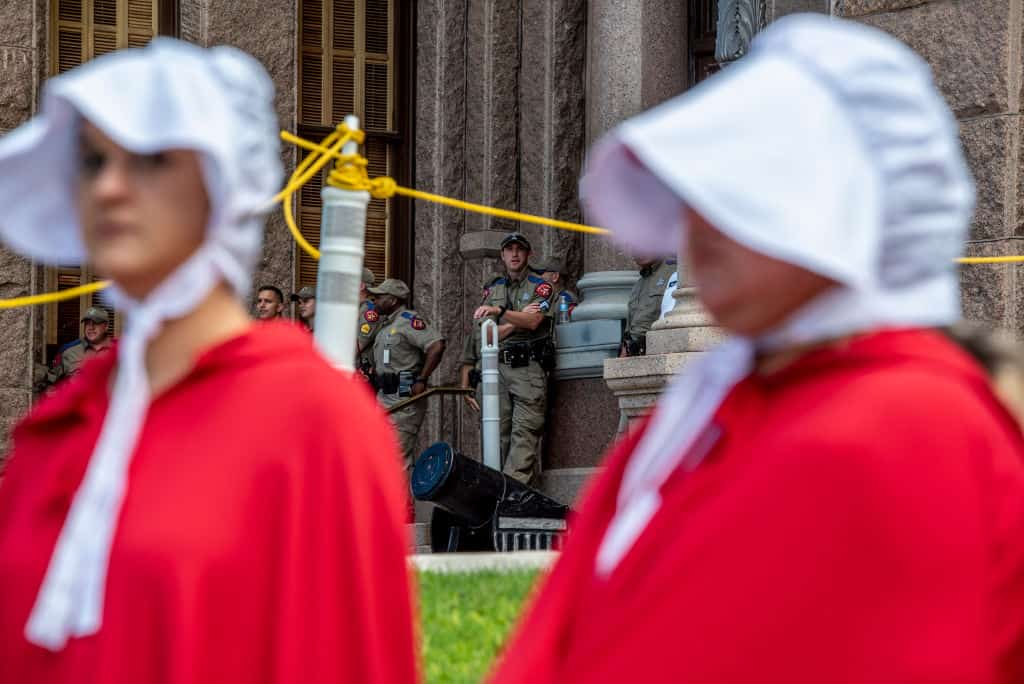Almost a decade ago, my husband, Chris, and I began seeing significant changes in our hometown community of Granbury, Texas. We were witnessing an overt merging of religion and politics. After a great deal of reading and research, we were fortunate enough to find experts who had been writing about what we were seeing. What we were experiencing was a local Christian nationalist takeover.
Christian Nationalism isn’t a new movement, and the ideas behind it have existed in America for generations. While there is plenty of evidence that Christian nationalism has been alive and well throughout American history, many of us have had our first experience with it, even if we didn’t know what to call it, in the last 40 years.
It’s helpful to have a clear and concise definition of Christian Nationalism. To quote Amanda Tyler, executive director of BJC (Baptist Joint Committee for Religious Liberty), “Christian nationalism is a political ideology and cultural framework that seeks To merge American and Christian identities. It suggests that real Americans are Christians and that true Christians hold a particular set of political beliefs.” Christian Nationalism privileges a version of Christianity above all other faith traditions and non-believers, and it threatens American democracy.
Why is Christian Nationalism so dangerous and what are its characteristics? It is dangerous because it gives preference to some Americans while marginalizing others. According to the research of professors Samuel Perry and Andrew Whitehead, those who embrace Christian Nationalism are most likely to be prejudiced towards racial minorities and hold views that oppose LGBTQ rights. They embrace a patriarchal hierarchy in family, business, and politics. They are inclined to deny science. They elevate 2nd Amendment rights above other rights. They tend to support anti-immigrant policy and are drawn to authoritarian leadership. They support privatizing education by defunding public schools via “school choice”. Christian nationalists also want to erect barriers to voting. In 1980, at a religious-right event in Dallas, Paul Weyrich, who co-founded the Heritage Foundation and ALEC, said “I don’t want everybody to vote…our leverage in the election goes up as the voting populous goes down.”
Now let’s think about what we’ve seen in Texas, and throughout the United States, in the last few years. We’ve witnessed lawmakers support bathroom bills, “Don’t Say Gay” bills, and policies that endanger transgender individuals. The Supreme Court overturned Roe v. Wade, taking us back decades in reproductive freedom. We’ve experienced attacks on voting rights, Critical Race Theory hysteria, Muslim bans, and fear-mongering about the Southern border. Book banning and claims of pornography in libraries have taken off like wildfire. Authoritarian Viktor Orbán was invited to speak at CPAC. Anti-vax ideology is ballooning, and Texas Governor, Greg Abbott, proclaimed a stop to any official Covid mitigation in his State of the State address. Americans have suffered through almost daily mass shootings, and we’ve simultaneously watched lawmakers expand access to guns. This legislative session, here in Texas, we are witnessing a hard push for vouchers (aka school choice) from Greg Abbott and Lt. Governor Dan Patrick. And perhaps the vilest and most egregious example of high-profile Christian Nationalism was an insurrection at the United States Capitol on January 6th of 2021. Insurrectionists stood in the House Chamber and read from the Bible while debasing the halls of Congress. These things may feel like separate issues that we have to go fight, but the reality is, they are all rooted in the same ideology. That ideology is Christian Nationalism.
What this translates to is a number of lawmakers who are injecting their personal religious interpretations into official public policy. It’s ok for elected officials to draw from their spiritual life to find guidance so long as they are not using their religious beliefs to remove rights, freedoms, and equality from others, who may differ from them. We do not have a declared national religion. The Constitution makes clear, “No religious Test shall ever be required as a Qualification to any Office or public Trust under the United States.” The First Amendment says “Congress shall make no law respecting an establishment of religion, or prohibiting the free exercise thereof.” Our forefathers purposely left room for everyone to have the freedom to worship (or not worship) as they saw fit. Christian nationalists see the separation of Church and State as a misconception, a one-way wall. I’ve been in the room while Rafael Cruz, Senator Ted Cruz’s father, said “the separation of Church and State is a myth promoted by the secular humanists.” Americans who embrace the ideology are actively seeking to gain levers of governmental power from the local school board all the way to the White House.
Is there good news? Yes. Christian Nationalism is finally on the public radar and is being discussed in mainstream media. Experts on the subject continue to sound the alarm. Because of this, Americans are much more aware than they were even two or three years ago. In a recent PRRI poll, only 29% of Americans are aligned with Christian nationalist ideology. However, it is a very loud and committed 29%. That means the rest of us can make a big difference by organizing, speaking up, and voting. We must discuss it with our family, friends, and neighbors. It’s up to all of us to educate those in our circle of influence. And we can! All of us using our voices, including Millennials and Gen Z, can absolutely make a difference in protecting American democracy and holding Christian Nationalism at bay.
Mendi Tackett advocates for public education and has worked to raise awareness about Christian nationalism, and the threat it poses to American democracy




